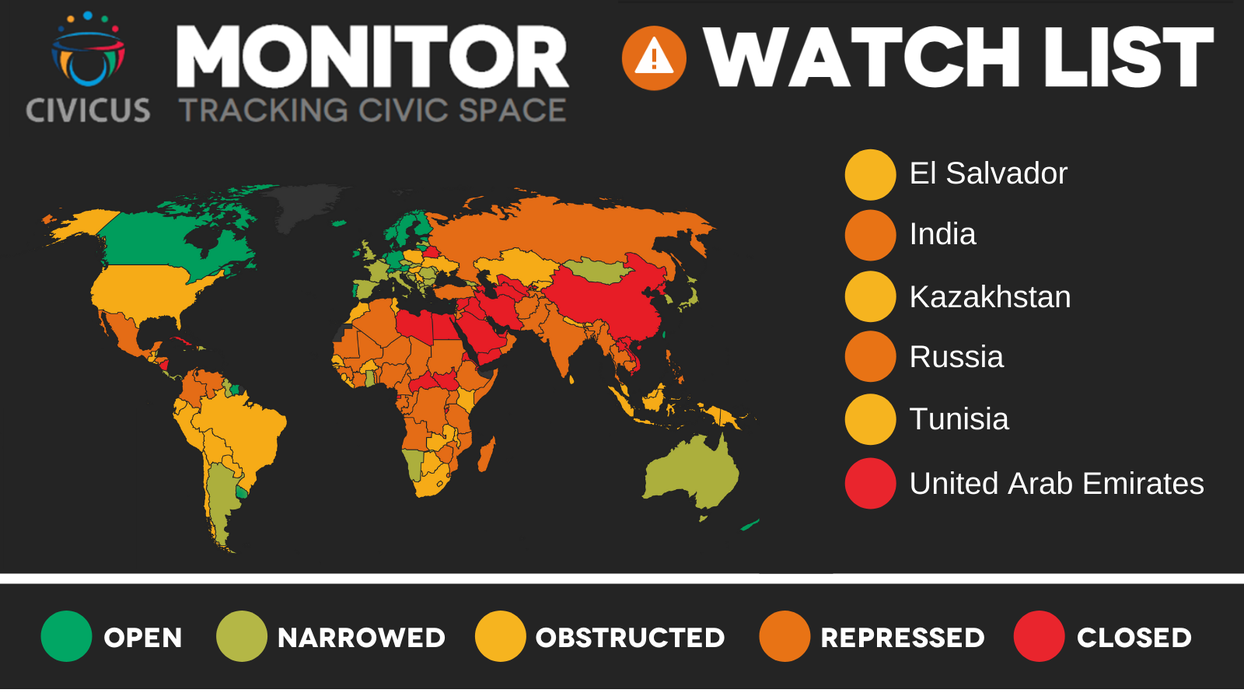India

INDIA PRESS RELEASE
India added to human rights watchlist as government blocks funding of NGOs and keeps activists behind bars
Johannesburg, 10 March 2022
- Government raids offices of NGOs and blocks their funding
- Journalists and activists targeted by Pegasus Spyware
- Activists in detention under draconian laws
India has been added to a watchlist of countries that have seen a rapid decline in civic freedoms. Prime Minister Narendra Modi continues to resort to drastic measures to silence critics of his nationalist Bharatiya Janata Party (BJP).
The new watchlist is released by the CIVICUS Monitor, an online platform that tracks the latest developments to civic freedoms, including the freedoms of expression, association and peaceful assembly, across 197 countries and territories. Other countries included on the list are El Salvador, Kazakhstan, Tunisia, Russia and the United Arab Emirates.
In January, the Central Bureau of Investigation conducted raids on a prominent human rights watchdog, People’s Watch in Madurai. Indian authorities used politically motivated allegations of fraud and financial irregularities to target the civil society organisation, which has been an outspoken critic of the government. The raid came on the heels of over 6,000 other civil society organisations losing their licenses, including Oxfam, under the controversial Foreign Contribution (Regulation) Act. The government has used the law to ban organisations from receiving foreign funds.
Since coming to power in 2014, Prime Minister Narendra Modi has sought to squeeze charities and nonprofit groups that receive foreign funds. Greenpeace and Amnesty International are among the civil society groups that have had to close their offices in India.
Scores of human rights defenders and activists remain in detention under the draconian Unlawful Activities (Prevention) Act (UAPA) and other laws. They include the 15 human rights defenders linked to the 2018 Bhima Koregaon incident who have been accused of having links with Maoist organisations, based on evidence believed to be fabricated. Further, at least thirteen activists arrested under the UAPA for their advocacy work against the discriminatory Citizenship (Amendment) Act (CAA) 2019 remain in detention. The slow investigative processes and extremely stringent bail provisions ensure that those detained under the law are held in pre-trial detention for long periods.
“The office raids and foreign funding bans are part of the government’s strategy to harass and silence their critics”, said Josef Benedict, Civic Space Researcher for the CIVICUS Monitor. “The use of broadly worded anti-terrorism laws against activists, journalists, academics, and students, reflect a multi-year decline in the state of civic and democratic freedoms in the country.”
Journalists have continued to be targeted in India for their work in recent months and there have also been concerns about the widespread surveillance of activists, journalists and others critical of the Modi government following the Pegasus spyware expose.
“The government must release all human rights defenders detained and come clean about its surveillance of activists and journalists as well as establish an independent and effective oversight mechanism to monitor all stages of interceptions of communications” said Henri Tiphagne the National Working Secretary of HRDA - India.
Ground zero for a lot of the persecution and harassment has been in Indian-administered Jammu and Kashmir. Since August 2019, when the government revoked the constitutional autonomy of the country’s only Muslim majority state and split Jammu and Kashmir into two federally governed territories, hundreds have been detained and restrictions placed on internet access. In recent months, the government has arrested human rights defender Khurram Parvez as well as journalists and taken control of the Kashmir Press Club - the largest independent media body in Kashmir
India is currently rated Repressed by the CIVICUS Monitor. There are a total of 49 countries in the world with this rating (see all). This rating is typically given to countries where civic space is heavily contested by power holders, who impose a combination of legal and practical constraints on the full enjoyment of fundamental rights (see full description of ratings).
DOWNLOAD FULL COUNTRY RESEARCH BRIEF
For more details, or to arrange an interview, please contact: